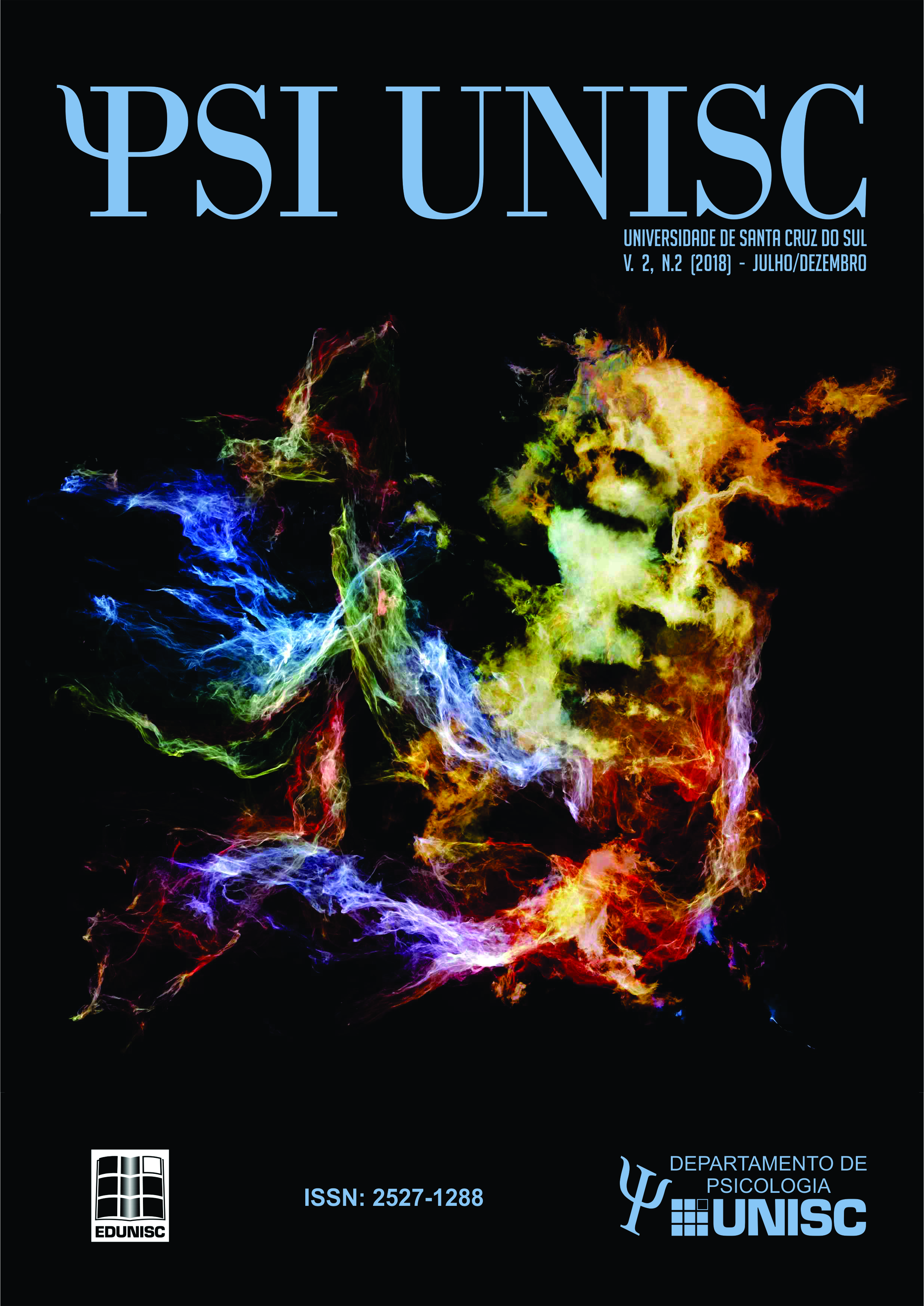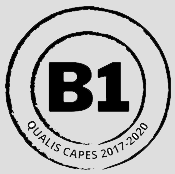Possible Roads Between Ethics and Existential Phenomenological Psychotherapy
DOI:
https://doi.org/10.17058/psiunisc.v2i2.11770Keywords:
Psychotherapy, Existential phenomenology, Ethic, Martin HeideggerAbstract
The present work discusses two themes of the psychological clinic: ethics and psychotherapeutic practice. At the same time, these themes are accompanied by human impasses in the face of demands for adequacy and objectivity. Ethically human beings organize their lives prior to the consolidation of ethics as a discipline and the legitimacy of it in the professional codes of conduct of different sciences. However, everyday ethics reaches different meanings to rules and duties; it is on these senses that this work has been devoted. Particularly, in the psychotherapeutic model inspired by the Existential Phenomenology, ethics was exposed through the ways of being of the human in the coexistence with the impasses proper to existence. Thus, the psychotherapeutic work was highlighted in the invitation to update the exercises of thinking and feeling about the ways in which human beings inhabit the world. The method supports the existential phenomenological psychotherapy in that it inspires the path in this work that is to be attentive to show understanding of everyday experience, especially in the sensitization of professionals and clients on the relations established between reason and feelings (affections) destabilizing the absolute certainties and anticipatory beliefs regarding the way we organize ourselves. Methodologically, we choose some directions by adopting the description of events as research content, associating this understanding-interpretation as combined actions in order to allow the opening of meanings to the experiences announced by the client. The psychotherapist / client encounter and the way the psychotherapeutic experience was conducted are ethical expressions from a perspective that encourages the opening of possibilities as to the being-with of the man in his daily life.Downloads
References
Aristóteles. (1852). Ética a Nicómaco. In A. C. Caeiro (Trad.), (5ª ed.). Portugal: Editora Quetzal Textos Clássicos, 2015. (publicado originalmente em 1852)
Bauman, Z. (1997). Ética pós-moderna. São Paulo, Brasil: Paulus
Boff, L. (2003). Ética e Moral: a busca dos fundamentos. Petrópolis, Brasil: Editora Vozes
Camps, V. ed. (1999). História de la ética. 1. De los griegos al Renascimento. Barcelona, Espanha: Editora Crítica/Filosofía.
Camps, V. ed. (2006). História de la ética. 2. La ética moderna. Barcelona, Espanha: Editora Crítica/Filosofía.
Coelho Júnior, N. E. (2007). Ética & técnica em psicologia: Narciso e o avesso do espelho. Revista do Departamento da Psicologia da UFF, 19(2), 487- 493. doi: 10.1590/S0104-80232007000200018
Costa, C. (2006). Razões para o utilitarismo: uma avaliação comparativa dos pontos de vida éticos. In A. B. N. T. Meneses (Org.), Ética, bioética: diálogos interdisciplinares. Natal, RN, Brasil: EDUFRN
Dutra, E. (2004). Considerações sobre as significações da psicologia clínica na contemporaneidade. Estudos de Psicologia (Natal), 9(2), 381-387. doi: 10.1590/S1413-294X2004000200021
Figueiredo, L. C. (1995). Foucault e Heidegger – a ética e as formas históricas do habitar e do não habitar. Tempo Social. Rev. Sociol. USP, 7 (1-2), 139-149. doi: 10.1590/ts.v7i1/2.85214
Figueiredo, L. C. (2009). Revisitando psicologia: da epistemologia à ética das práticas e discursos psicológicos. Petrópolis, RJ, Brasil: Editora Vozes.
Giorgi, A. & Sousa, D. (2010). Método fenomenológico de investigação em psicologia. Lisboa, Portugal: Fim de Século Edições
Heidegger, M. (2005). Carta sobre o humanismo. São Paulo, SP, Brasil: Centauro Editora
Heidegger, M. (2007). A questão da técnica. Scienti & Studia, 5(3), 375-398. doi: 10.1590/S1678-31662007000300006
Heidegger, M. (2009). Seminário de Zollikon. In G. Arnold, & M. F. A. Prado (Trad.). Petrópolis, Brasil: Editora Vozes.
Heidegger, M. (2011). Os conceitos fundamentais da metafísica: mundo, finitude, solidão. Rio de Janeiro, Brasil: Forense Universitária
Heidegger, M. (1927). Ser e tempo. In F. Castilho (Trad.). Campinas, Brasil: Editora da Unicamp; Vozes, 2012. (publicado originalmente em 1927)
Hodge, J. (1995). Heidegger e ética (Coleção Pensamento e Filosofia). Lisboa, Portugal: Editora Instituto Piaget.
Kant, I. (1785). Fundamentação da Metafísica dos Costumes (Coleção Textos Filosóficos). Lisboa, Portugal: Edições 70, 2014. (Publicado originalmente em 1785)
La Taille, Y. (2006). Moral e ética: dimensões intelectuais e afetivas. Porto Alegre: Editora Artmed.
Leal, I. F. A., Sant´Anna, J. L., Bueno, J. C., Souza, L. R. A., & Sá, R. N.(2010). Atitude fenomenológica e atitude psicoterápica. Estudos e Pesquisas em Psicologia, 10(2), 633-637. Recuperado de http://pepsic.bvsalud.org/scielo.php?script=sci_arttext&pid=S1808-42812010000200020&lng=pt&tlng=pt.
Loparic, Z. (2004). Ética e finitude. São Paulo: Editora Escuta
Maia, M. S. (2009). Por uma ética do Cuidado. Rio de Janeiro: Editora Garamond.
Nietzsche, F. (2008). Para além do bem e do mal. São Paulo: L&PM Pocket
Nietzsche, F. (2011). Assim falou Zaratrusta. São Paulo: Companhia das Letras
Nietzsche, F. (2012). Gaia Ciência. São Paulo: Companhia das Letras
Safra, G. (2004). A Po-ética na clínica contemporânea. Aparecida: Editora Idéias & Letras.
Safra, G. (2009). Dimensões do silêncio: a constituição do si mesmo e perspectivas clínicas. Cad. Psicanálise-CPRJ, 31(22), 75-82. Recuperado de http://cprj.com.br/imagenscadernos/06.Conferencia_de_Gilberto_Safra.pdf
Sartre, J.-P. (1970). O existencialismo é um humanismo?. Lisboa: Editora Presença, 2012. (publicado originalmente em 1970)
Silva, É. R. (2001). Psicologia clínica, um novo espetáculo: dimensões éticas e políticas. Psicologia: Ciência e Profissão, 21(4), 78-87. doi: 10.1590/S1414-98932001000400009
Silva, E. J. (2013). A ética Aristotélica como caminho que conduz o homem a felicidade plena. Revista Húmus. 7(3), 74-86. Recuperado de http://www.periodicoseletronicos.ufma.br/index.php/revistahumus/article/view/1501
Downloads
Published
How to Cite
Issue
Section
License
The submission of originals to this journal implies the transfer, by the authors, of the printed and digital publication rights. The copyrights for the published articles are those of the author, with periodical rights on the first publication. Authors may only use the same results in other publications clearly indicating this journal as the medium of the original publication. Because we are an open access journal, we allow free use of articles in educational and scientific applications provided the source is cited under the Creative Commons CC-BY license.




